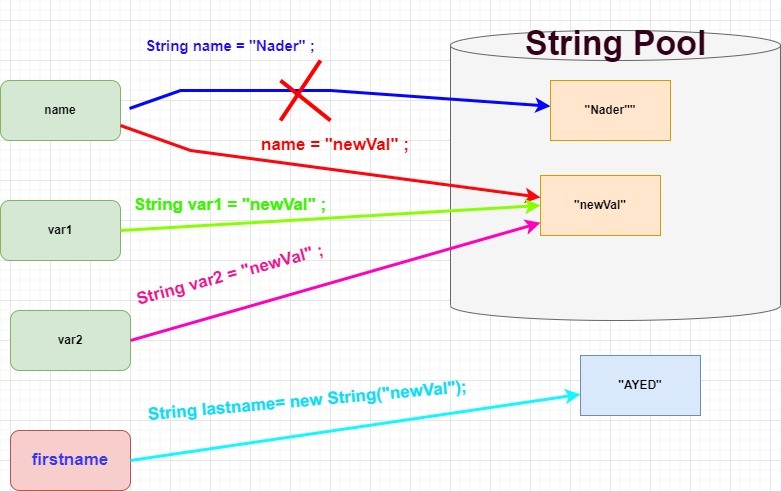Why Are Strings Immutable in Java? Protection and Efficiency Conveniences
Why Are Strings Immutable in Java? Protection and Efficiency Conveniences
Blog Article
Immutable Strings: A Secret Component in Ensuring Information Uniformity and Reliability
In the realm of data monitoring, the significance of immutable strings can not be overemphasized. These changeless series of characters play a crucial duty in promoting the stability and precision of details within systems. By maintaining a state of immutability, data uniformity is made sure, fostering a structure of integrity upon which vital processes count. The idea of immutable strings transcends simple triviality; it is a cornerstone in the complex internet of data governance. As we check out the advantages, implementation strategies, and useful applications of immutable strings, a clearer photo arises of their indispensable nature in securing the digital landscape.
The Idea of Immutable Strings
Unalterable strings, a basic concept in programs, describe strings that can not be changed when they are created. Fundamentally, when a string worth is appointed, any type of procedure that appears to customize the string really creates a brand-new string. This immutability makes certain data consistency and reliability in applications, as it protects against unexpected changes to the original information.
Benefits in Information Uniformity

Data consistency is vital in different elements of software application growth, including data source administration, multi-threaded settings, and dispersed systems (Why are strings immutable in Java?). Unalterable strings contribute considerably to accomplishing this uniformity by protecting against information corruption because of simultaneous accessibility. In scenarios where numerous processes or threads communicate with the very same data at the same time, immutable strings function as a guard versus race conditions and synchronization concerns
Furthermore, the immutability of strings streamlines debugging and testing processes. With unalterable strings, designers can rely on that once a string is set, it will stay unchanged, making it less complicated to map the resource of errors and guaranteeing that examination instances produce regular results. This dependability in data managing inevitably causes more secure and robust applications.

Carrying Out Immutable Strings
Guaranteeing the immutability of strings calls for a thoughtful technique to their application in software growth. One vital technique is to design string courses in such a way that stops adjustments as soon as a string item is created. By making strings immutable, designers can boost information uniformity and reliability in their applications.
To apply immutable strings properly, programmers should favor creating new string objects as opposed to customizing existing ones. This practice makes sure that internet when a string is appointed a value, it can not be transformed. In addition, any kind of operation that shows look what i found up to change the string needs to create a new string with the desired changes rather than altering the initial.
In addition, using unalterable strings can streamline concurrency management in multi-threaded settings. Since unalterable strings can not be changed after development, they can be securely shared amongst numerous strings without the danger of information corruption.
Duty in Integrity Assurance
In software application advancement, the application of unalterable strings plays a crucial duty in making certain the dependability of information operations. Unalterable strings, once created, can not be modified, guaranteeing that the information they stand for stays constant throughout the application's implementation. This immutability property gives a degree of guarantee that the data being processed will certainly not be inadvertently altered, causing unexpected results or errors in the system.
By integrating unalterable strings into software style, developers can boost the integrity of their applications by decreasing the threats associated with mutable information - Why are strings immutable in Java?. Unalterable strings aid in preventing data corruption or unintended modifications, which can be particularly important when dealing with delicate information or when information stability is vital
Moreover, making use of unalterable strings simplifies concurrent handling, as numerous strings can securely gain access to and share string data without the risk of one thread altering the content while one more is reading it. This facet contributes substantially to the total integrity of the software application system, making certain predictable and regular habits in data handling operations.
Applications and System Assimilation
The seamless integration of unalterable strings right into various applications and systems is critical for ensuring durable data consistency and dependability throughout diverse technical environments - Why are strings immutable in Java?. Unalterable strings play a critical function in boosting the honesty of information exchanges and communications within complex software ecosystems. By including immutable strings right into applications, designers can alleviate the dangers connected with information tampering, unauthorized adjustments, and unintended modifications, thus strengthening the general safety posture of hop over to these guys the system
In the context of system combination, unalterable strings offer as a foundational element for developing safe communication networks and facilitating seamless data transfers between various components. Their immutable nature ensures that information transmitted between systems stays proven and unmodified, minimizing the possibility of variances or mistakes that might endanger the integrity of the entire system. In addition, immutable strings can improve interoperability in between inconsonant systems by supplying a standard layout for information depiction, allowing a lot more effective data handling and exchange procedures throughout interconnected platforms. By taking on unalterable strings in applications and system assimilation procedures, companies can fortify their data infrastructure and support the integrity and consistency of their details assets.
Verdict
Finally, immutable strings play a critical duty in keeping information uniformity and integrity in different applications and system integrations. By ensuring that strings can not be altered once created, the honesty of data is maintained, reducing the danger of mistakes and inconsistencies. Carrying out immutable strings can significantly improve the dependability of systems, ultimately causing more exact and reliable data processing.

Report this page